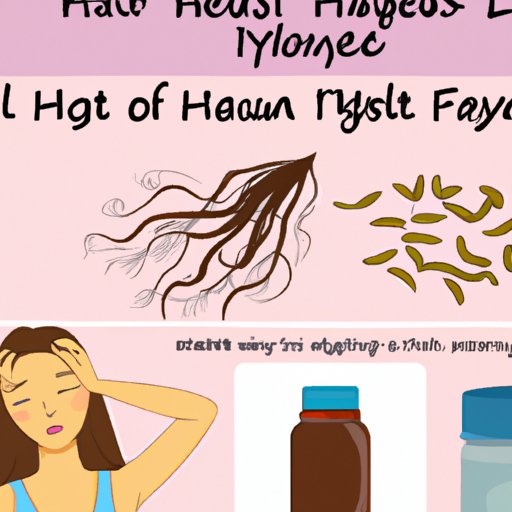Introduction
Postpartum hair loss is a common phenomenon experienced by many women, particularly after childbirth. It is characterized by excessive hair shedding, thinning or bald patches that can last for months or even years. In this article, we explore what causes postpartum hair loss, when does it start and how to manage it.
Exploring the Timeline of Postpartum Hair Loss
When does postpartum hair loss begin? Generally, it begins shortly after delivery, usually within the first three months. It can last for several months, but in some cases, it can persist for up to one year. There are various risk factors associated with postpartum hair loss, including hormonal changes during pregnancy, dietary changes, stress and trauma.
What Causes Postpartum Hair Loss and When Does it Start?
Hormonal changes during pregnancy can cause a woman’s hair to become thicker and fuller. However, after childbirth, these hormones return to their pre-pregnancy levels, resulting in a sudden drop in estrogen. This sudden change in hormones can cause a condition known as telogen effluvium, which is characterized by increased hair shedding. Postpartum hair loss can also be caused by changes in diet and lifestyle, such as inadequate nutrition or an increase in stress levels.

Understanding the Stages of Postpartum Hair Loss
Telogen effluvium is the most commonly observed type of postpartum hair loss. It is characterized by an increase in the number of hairs entering the resting phase of the hair growth cycle. This results in increased shedding and thinning of existing hair. Another type of postpartum hair loss is anagen effluvium, which is a rarer form of hair loss that occurs when the growing phase of the hair growth cycle is disrupted. This can lead to sudden hair loss or bald patches.
How to Manage Postpartum Hair Loss
The treatment of postpartum hair loss depends on the underlying cause. Medication, such as oral contraceptives or anti-androgens, can be used to reduce hair shedding. Changes in diet, such as increasing protein intake and taking supplements, can also help promote healthy hair growth. Stress management techniques, such as yoga and meditation, can also be beneficial in reducing hair shedding.

Tips for Dealing with Postpartum Hair Loss
It is important to take care of your hair during this time. Avoiding harsh chemicals, such as dyes and styling products, can help reduce damage to your hair. Protecting your scalp from the sun is also important, as ultraviolet rays can cause further damage. Additionally, using a gentle shampoo and conditioner can help keep your hair healthy.
Diet and Exercise Strategies for Postpartum Hair Loss
Eating a balanced diet that includes foods rich in proteins, vitamins, minerals and essential fatty acids can help promote healthy hair growth. Supplements such as biotin, zinc and iron can also be taken to support hair growth. Regular exercise can also help boost circulation and improve overall health, which can result in healthier hair.

Natural Remedies for Postpartum Hair Loss
Essential oils, such as lavender and rosemary, can be used to massage the scalp and stimulate hair growth. Herbal remedies, such as saw palmetto and green tea, are also believed to encourage hair growth. Scalp massages can also help promote blood circulation to the scalp and stimulate hair follicles.
Conclusion
Postpartum hair loss is a common occurrence for many women. While the exact cause of postpartum hair loss is still not fully understood, it is thought to be related to hormonal changes, dietary changes and stress. Understanding the stages of postpartum hair loss, as well as the various treatment options available, can help women manage this condition. Additionally, diet and exercise strategies as well as natural remedies can also be used to promote healthy hair growth.
If you are experiencing postpartum hair loss, it is important to speak to your doctor or healthcare provider. They can provide advice on managing the condition and recommend any additional resources that may be helpful.


